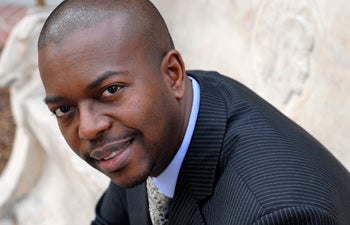From Mock Trial to Real Cases
Seated at a counsel table in a Los Angeles County courtroom, Elvira Kras anxiously awaited the jury’s decision. After years of work, she listened as the jury awarded Mohammed Usman Chaudhry’s family $1.7 million in compensatory damages.
Justice was upheld and Kras had helped ensure it.
The USC Dornsife alumna was one of seven members of the USC Mock Trial Team to answer the call from Olu Orange, adjunct assistant professor of political science in USC Dornsife, to help with the case. For two years, they gathered evidence to show Los Angeles Police Department (LAPD) Officer Joseph Cruz was accountable for the death of Chaudhry, a 21-year-old autistic man.
The case centered around Cruz, a former LAPD officer who was let go from the department for reasons unrelated to the case. In March 2008, Chaudhry, who favored a transient lifestyle, was lying behind bushes near an apartment building in a Hollywood neighborhood when he was approached by Cruz. According to police testimony, Cruz fired at the victim when Chaudhry lunged at the officer with a knife. Cruz fired four shots; three struck Chaudhry in the chest killing him.
The same year, the L.A. Police Commission launched a probe. The five-member civilian board concluded Cruz’s decision to use deadly force against Chaudhry was justified.
Subsequently, Chaudhry’s family hired Orange to prove the officer violated civil rights. Orange turned to USC students to help him collect enough information to dispel Cruz’s account of what happened that night. The lack of evidence provided by LAPD led the team to believe there was more to the story, Orange said.
“The students uncovered evidence and found witnesses that the LAPD said essentially did not exist,” Orange said. “Based on a large part of the evidence and witnesses who the students were able to uncover, the jury came back with the finding that the city and the LAPD officer were liable for his death and that the killing was done with malice; an additional finding that was extraordinary.”

Olu Orange is an adjunct assistant professor of political science in USC Dornsife. Photo by Carlos Puma.
The case was an eye-opener for Kras who handled trial exhibits, kept time and took copious witness notes for Orange’s closing statements. Although the heavy workload was a bit overwhelming, an added pressure came when she realized just how much weighed on the team’s shoulders.
“It was definitely a lot more difficult and strenuous than I imagined it could be, but it made me want to be a lawyer even more,” said Kras, the team’s assistant coach who graduated in 2010 with a major in English and will attend law school in the fall.
Like Kras, students were motivated to volunteer their time not only for the firsthand experience, but also to advocate for a citizen whose rights had been violated.
“My first reaction was, is there anything I can do? And in this situation there was something that I could do,” said Catherine Veeneman, a USC Dornsife senior majoring in international relations. “I was really happy to do anything to try and make sure justice was delivered.”
As Orange and his “justice squad” put the puzzle together, they gleaned information from several witnesses while canvassing the Hollywood neighborhood and took statements from neighbors— some reticent about divulging details, others more forthcoming — and members of the homeless community.
Each student played a crucial role as they spent hours, months and years working to bring new information to the jury. Kras helped put residents at ease serving as translator for Russian and Armenian witnesses in the area. She also conducted mock cross-examinations. Team members MiRi Song, who completed a triple major in philosophy, sociology and East Asian studies from USC Dornsife, and Sharisse Deal, a USC Annenberg School for Communication & Journalism graduate, traveled to Nevada to interview a potential eyewitness.
After two years, Orange and his team collected enough evidence to convince jurors to reject Cruz’s account. For example, one man testified that he had witnessed Cruz confront Chaudhry and call him by name on several occasions before the deadly encounter. Cruz maintained he had never met the victim prior to the shooting.
Throughout the process, Orange’s confidence in his team never wavered.
“The experience students have with the mock trial program is not generally something you get until you’re in law school, but I make it available to them now,” said Orange who also brought students onboard to assist in interviewing witnesses for the lawsuit against LAPD misconduct during the highly publicized May Day immigration demonstration at MacArthur Park in 2007. The case resulted in a nearly $13 million settlement.
Team members have continued to prove their capabilities since the group’s inception in 2001, ranking among the nation’s best.
The students’ work did not stop once Orange won the case in January. Orange charged them with other important tasks. James Miao, a senior with a major in business administration, reviewed the county’s depositions and identified flaws in the county coroner’s policies.
“We are not just playing pretend lawyers so to speak,” said Miao who will attend law school in the fall. “Professor Orange really makes an extra effort to give us opportunities to actually put into practice the things we learned.”